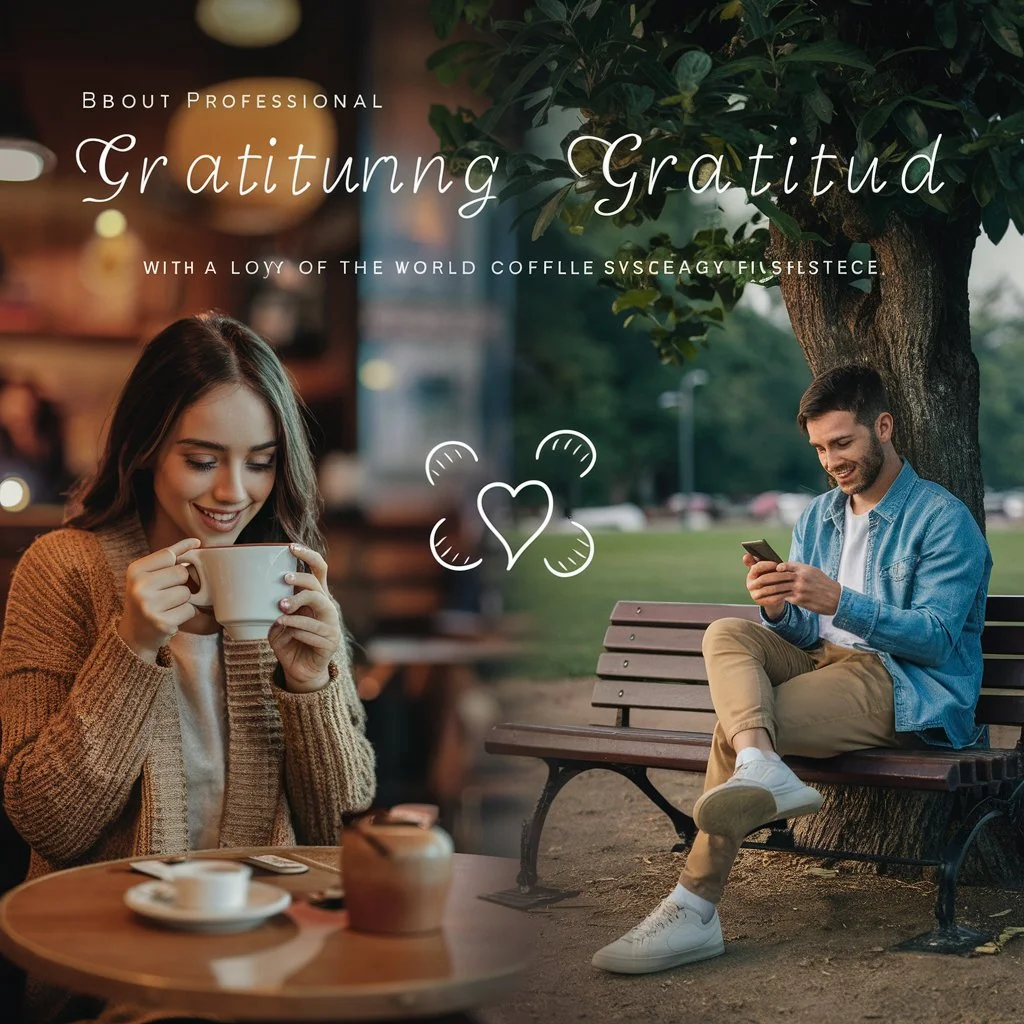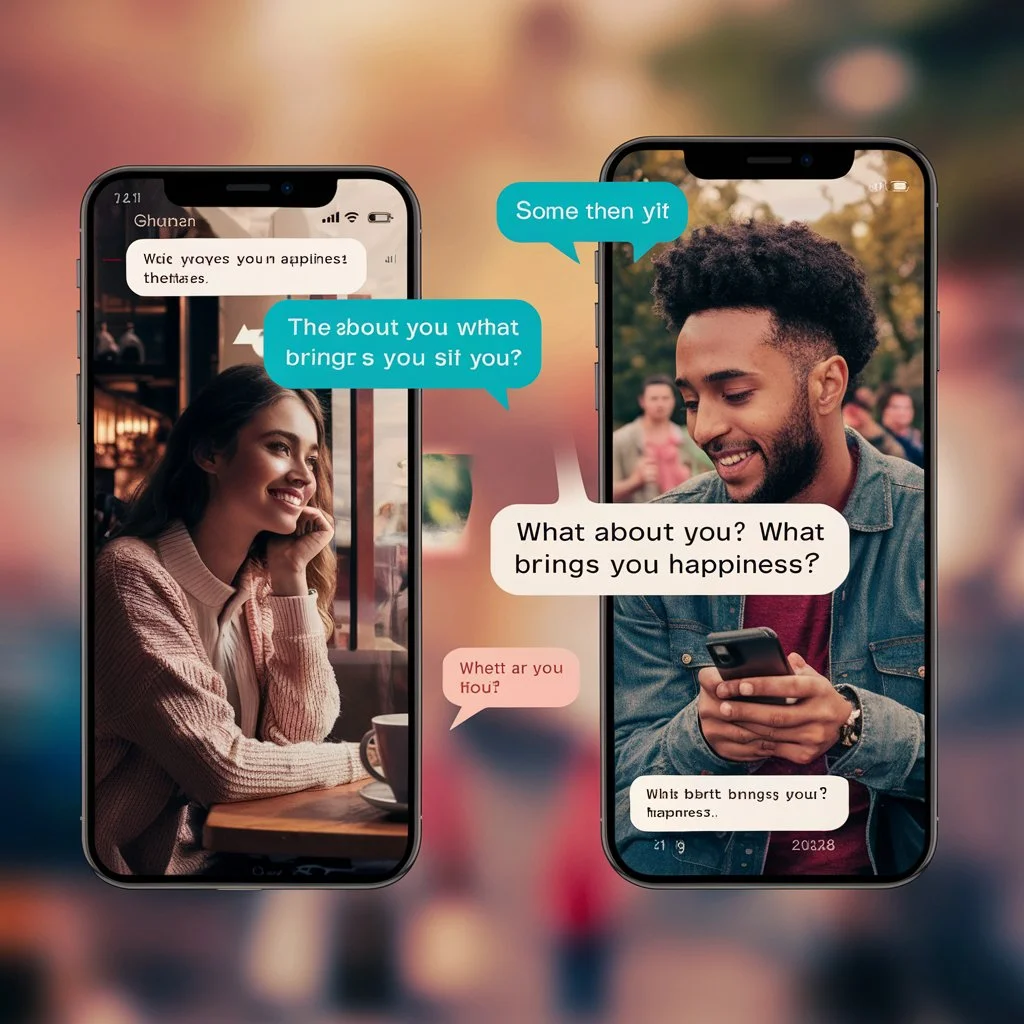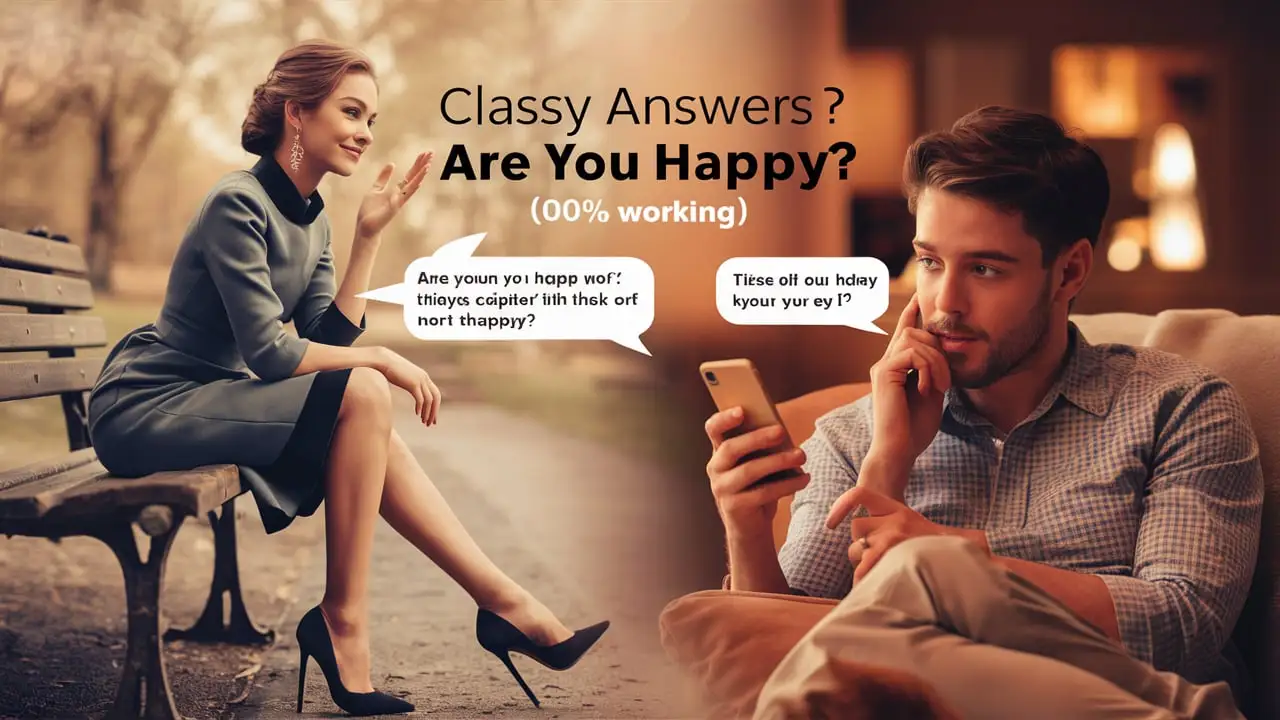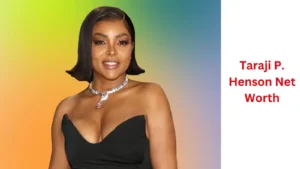Happiness is a deeply personal and often complex emotion. When someone asks, “Are you happy?” it can be challenging to find the right words to express your feelings.
Whether you are in a reflective mood, want to keep things light-hearted, or aim to be sincere, having a repertoire of classy responses can be invaluable. This article explores 30 creative replies that convey your emotions thoughtfully and elegantly.
These responses range from philosophical musings to simple expressions of gratitude, ensuring you have the perfect answer for any situation.
Reflective Response: “Happiness Is A Journey, Not A Destination”

When asked if you are happy, reflecting on the nature of happiness itself can provide a thoughtful response. Saying, “Happiness is a journey, not a destination,” underscores that happiness is an ongoing process rather than a final goal. It acknowledges that while you may not always feel elated, you are continually working towards a state of contentment.
In a conversation, you might elaborate: “I’ve come to realize that happiness isn’t a permanent state but a series of moments we experience along the way. It’s about appreciating the journey and finding joy in small victories.”
Simple Yet Sincere: “I Find Joy In The Little Things”
A simple yet heartfelt reply can resonate deeply. Saying, “I find joy in the little things,” highlights your appreciation for the small pleasures in life. This response conveys a sense of mindfulness and gratitude.
For example, you could explain: “For me, happiness comes from the little things, like a beautiful sunset, a good book, or a kind gesture. These moments bring me genuine joy and fulfillment.”
Thought-Provoking Reply: “Happiness Is Subjective, Don’t You Think?”
A thought-provoking answer can turn the question into an engaging conversation. Responding with, “Happiness is subjective, don’t you think?” invites the other person to share their perspective on happiness.
You might continue the dialogue by saying: “Everyone has their own definition of happiness. For some, it’s about achieving big goals, while for others, it’s about enjoying the present moment. What’s your take on it?”
Expressing Gratitude: “I’m Grateful For Every Moment”
Gratitude is a powerful expression of happiness. By saying, “I’m grateful for every moment,” you convey a sense of appreciation for life as it is.
You can expand on this by sharing: “I believe that being grateful for each moment, whether good or bad, helps me maintain a positive outlook. Even during tough times, there are always things to be thankful for.”
Humble Answer: “I Appreciate What I Have And Strive For More”
Humility combined with ambition makes for a balanced response. Saying, “I appreciate what I have and strive for more,” shows that you are content but also motivated to achieve more.
In a conversation, you might add: “I’m happy with what I’ve accomplished so far, but I also believe in setting new goals and challenging myself. It’s a balance between contentment and growth.”
Personal Insight: “I’m Content With My Progress In Life”
Sharing a personal insight can make your response more meaningful. Saying, “I’m content with my progress in life,” reflects your satisfaction with your personal journey and achievements.
For instance, you could say: “Looking back, I’m proud of how far I’ve come. While there are always areas to improve, I’m content with my progress and excited about the future.”
Philosophical Angle: “Happiness Is Fleeting But I Cherish It When It Comes”
A philosophical perspective can add depth to your response. By saying, “Happiness is fleeting but I cherish it when it comes,” you acknowledge the transient nature of happiness while expressing appreciation for its moments.
You might elaborate: “I’ve learned that happiness comes in waves. It doesn’t last forever, but when it does appear, I make sure to savor and cherish those moments.”
Positive Outlook: “I’m Focused On The Positives In My Life”
Maintaining a positive outlook is a great way to answer the question. Saying, “I’m focused on the positives in my life,” shows that you choose to emphasize the good over the bad.
For example, you could explain: “There are always challenges, but I prefer to focus on the positives. By doing so, I find that I can navigate through difficulties with a better mindset.”
Honest And Real: “I Have My Moments Of Happiness And Struggles”
An honest and real answer can be refreshing. By saying, “I have my moments of happiness and struggles,” you convey that happiness isn’t constant, and that’s okay.
You might say: “Life is a mix of ups and downs. There are times when I’m really happy and times when I face struggles. I think it’s important to acknowledge both sides.”
Emphasizing Growth: “I’m Working On Being The Best Version Of Myself”

Emphasizing personal growth can be an inspiring response. Saying, “I’m working on being the best version of myself,” indicates that you are focused on self-improvement and personal development.
In a conversation, you could add: “Every day, I strive to be a better person. It’s a continuous process, and while I may not be perfect, I’m proud of my efforts to grow and improve.”
Highlighting Relationships: “I’m Happy Because Of The People I Love”
Highlighting the importance of relationships can make your response heartfelt. Saying, “I’m happy because of the people I love,” emphasizes that your happiness is deeply connected to your relationships.
You might share: “My family and friends bring me immense joy. Their support and love are the foundation of my happiness, and I’m grateful for their presence in my life.”
Classy Responses To “Are You Happy?” For A Thoughtful Conversation
Acknowledging The Question: “I Appreciate You Asking About My Happiness”
Acknowledging the question shows that you value the other person’s interest in your well-being. By saying, “I appreciate you asking about my happiness,” you convey gratitude and openness.
You could continue: “It’s not every day someone asks about my happiness, and it means a lot. It’s a reminder to reflect on the good things in life.”
A Poetic Take: “My Heart Finds Peace In The Beauty Of Life”
A poetic response can add a touch of elegance to your answer. By saying, “My heart finds peace in the beauty of life,” you express a deep appreciation for the world around you.
For example, you might say: “There are so many beautiful aspects of life, from nature to art. These things bring peace to my heart and contribute to my overall happiness.”
Future-Focused: “I’m Building A Future That Makes Me Happy”
Focusing on the future can be an optimistic response. By saying, “I’m building a future that makes me happy,” you show that you are actively working towards a fulfilling life.
You might elaborate: “I’m excited about the future and the possibilities it holds. I’m taking steps now to ensure that my future is filled with happiness and success.”
Cultural Reference: “Like The Song, Don’t Worry, Be Happy!”
Using a cultural reference can make your response relatable and light-hearted. By saying, “Like the song, don’t worry, be happy!” you invoke a sense of familiarity and positivity.
You could add: “It’s a simple message, but it holds a lot of truth. Sometimes, we need to remind ourselves not to worry too much and focus on the positive aspects of life.”
Sharing A Positive Experience: “Today Was A Good Day, So Yes!”
Sharing a specific positive experience can make your answer more concrete. By saying, “Today was a good day, so yes!” you provide a direct and positive response.
For instance, you might say: “I’ve had a great day today, filled with productive work and good company. It’s days like these that make me feel truly happy.”
Philosophical Reflection: “Happiness Comes In Waves And I’m Riding Them”
A philosophical reflection can add depth to your response. By saying, “Happiness comes in waves and I’m riding them,” you acknowledge the fluctuating nature of happiness.
You could explain: “I’ve learned that happiness isn’t constant. It comes and goes, like waves in the ocean. Right now, I’m riding those waves and enjoying the journey.”
Gratitude Expressed: “I’m Grateful For The Good Things In Life”

Expressing gratitude is a powerful way to convey happiness. By saying, “I’m grateful for the good things in life,” you highlight the importance of appreciating what you have.
You might add: “There are so many things to be thankful for, from my health to my relationships. Focusing on these positive aspects helps me maintain a happy outlook.”
Humor With Class: “Happy As A Clam, But You Know, Less Salty”
Adding humor to your response can make it memorable and enjoyable. By saying, “Happy as a clam, but you know, less salty,” you provide a light-hearted and witty reply.
For example, you might say: “I like to keep things light and positive. Humor is a great way to express happiness and keep the conversation fun.”
Balanced View: “I Have My Ups And Downs, Like Everyone Else”
A balanced view shows realism and honesty. By saying, “I have my ups and downs, like everyone else,” you acknowledge that happiness isn’t constant but is a part of life’s journey.
You could elaborate: “Life is a mix of highs and lows. While I strive to be happy, I also understand that there will be challenging times. It’s all part of the experience.”
Emotional Honesty: “Happiness Is Complicated, But I Have Joyful Moments”
Emotional honesty can make your response relatable and sincere. By saying, “Happiness is complicated, but I have joyful moments,” you convey the complexity of happiness.
You might say: “Happiness isn’t always straightforward. It’s a mix of emotions, but I make sure to cherish the joyful moments whenever they come.”
Bringing It Back To The Question: “Why Do You Ask? Are You Happy?”
Turning the question back to the asker can create a meaningful dialogue. By saying, “Why do you ask? Are you happy?” you show interest in their feelings and promote a deeper conversation.
You could continue: “I’m curious about your perspective on happiness. It’s always interesting to hear what brings joy to others and how they navigate their own happiness.”
Unique And Classy Ways To Respond To “Are You Happy?”
Reflecting On Happiness: “Happiness Is A State Of Mind I Strive For Daily”
Reflecting on happiness as a state of mind can provide a thoughtful response. By saying, “Happiness is a state of mind I strive for daily,” you emphasize the importance of a positive mindset.
You might elaborate: “Every day, I make a conscious effort to maintain a positive outlook. It’s not always easy, but I believe that happiness starts with our mindset.”
Highlighting Positivity: “I Choose To Focus On The Positive Aspects Of Life”

Focusing on positivity is a powerful way to convey happiness. By saying, “I choose to focus on the positive aspects of life,” you demonstrate your commitment to maintaining a positive outlook.
For example, you could explain: “There are always challenges, but I prefer to focus on the positives. By doing so, I find that I can navigate through difficulties with a better mindset.”
Honest And Genuine: “I Have Happy Moments, And I Cherish Them”
Being honest and genuine can make your response more relatable. By saying, “I have happy moments, and I cherish them,” you acknowledge that happiness isn’t constant but is valuable when it occurs.
You might add: “Life is full of ups and downs. When happy moments come, I make sure to cherish and appreciate them, knowing that they are precious.”
Balanced Perspective: “Happiness Comes And Goes, And I’m Okay With That”
A balanced perspective shows realism and acceptance. By saying, “Happiness comes and goes, and I’m okay with that,” you acknowledge the transient nature of happiness and your acceptance of it.
You could explain: “I’ve learned that happiness isn’t permanent. It comes and goes, and that’s okay. I focus on enjoying it when it’s here and being resilient during tough times.”
Insightful Reply: “I Find Happiness In Personal Growth And Experiences”
An insightful reply can provide depth to your response. By saying, “I find happiness in personal growth and experiences,” you highlight the importance of self-improvement and life experiences.
For instance, you might say: “For me, happiness comes from personal growth and the experiences I have along the way. These moments of learning and discovery bring me great joy.”
Sharing A Personal Thought: “I’m Happy With The Path I’m On”
Sharing a personal thought can make your response more meaningful. By saying, “I’m happy with the path I’m on,” you reflect satisfaction with your current life journey.
You might add: “I’ve made choices that align with my values and goals, and that brings me a sense of happiness and fulfillment. I’m excited about where this path will lead me.”
Emphasizing Resilience: “I Face Challenges, But I Find Joy In Overcoming Them”
Emphasizing resilience can show strength and positivity. By saying, “I face challenges, but I find joy in overcoming them,” you highlight your ability to find happiness even in difficult times.
You could elaborate: “Challenges are a part of life, but I take pride in my ability to overcome them. Each obstacle I conquer brings a sense of accomplishment and joy.”
Philosophical View: “Happiness Is A Complex Emotion, But I Embrace It”
A philosophical view can add depth to your response. By saying, “Happiness is a complex emotion, but I embrace it,” you acknowledge the multifaceted nature of happiness and your acceptance of it.
You might explain: “Happiness isn’t a one-dimensional emotion. It’s complex and can be influenced by many factors. I embrace it in all its forms, knowing that it’s a vital part of life.”
Touching On Gratitude: “I’m Grateful For The Happiness I Experience”
Touching on gratitude can make your response heartfelt. By saying, “I’m grateful for the happiness I experience,” you emphasize the importance of appreciating moments of joy.
For instance, you could say: “There are so many things to be thankful for, and the happiness I experience is one of them. Being grateful helps me maintain a positive outlook.”
Keeping It Real: “I Have My Highs And Lows, But I’m Content Overall”
Keeping it real can make your response relatable and honest. By saying, “I have my highs and lows, but I’m content overall,” you acknowledge the fluctuating nature of happiness while expressing overall contentment.
You might add: “Life is a rollercoaster with its ups and downs. While I experience both happy and challenging times, I’m content with where I am and optimistic about the future.”
Encouraging Conversation: “What About You? What Brings You Happiness?”

Encouraging conversation can create a meaningful dialogue. By saying, “What about you? What brings you happiness?” you show interest in the other person’s feelings and promote a deeper exchange.
You could continue: “I’m curious to hear what makes you happy. Everyone has their own sources of joy, and it’s always interesting to learn about different perspectives on happiness.”
Conclusion
Answering the question “Are you happy?” doesn’t have to be a daunting task. Whether you choose to reflect on the nature of happiness, share a personal insight, or turn the question back on the asker, there are countless ways to respond thoughtfully and elegantly. These 30 creative replies provide a range of options to suit different moods and situations, ensuring you always have a classy answer at your disposal. Remember, happiness is a multifaceted and personal experience, and expressing it authentically can lead to meaningful and engaging conversations.

Matthew Porter is the visionary behind ReplySwift.com. With a talent for crafting concise and impactful responses, Matthew helps others communicate with clarity and confidence. On ReplySwift.com, he provides expert advice, practical templates, and valuable insights to enhance every reply. Join Matthew and transform your communication skills to make each response swift and effective.












